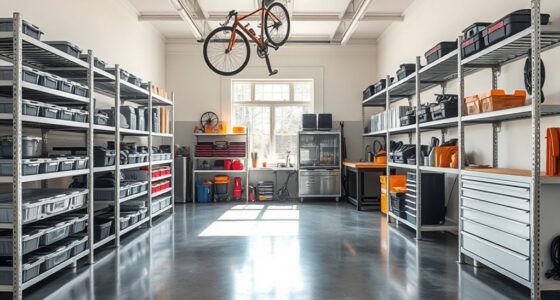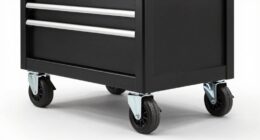When choosing the best shop vacuum, consider your cleaning tasks and environment. Look for models with high-quality filters like HEPA to trap fine dust and improve air quality. Opt for quieter units with good suction power, and think about capacity and portability for ease of use. Attachments matter too—make sure it includes tools suited for various messes. Keep in mind your specific needs, and you’ll find the perfect fit; there’s more to uncover to make an informed choice.
Key Takeaways
- Assess dust filtration needs; prioritize HEPA or advanced filters for fine dust and improved air quality.
- Consider noise reduction features for comfort during extended use, especially in shared or sensitive environments.
- Choose a model with suitable capacity and portability, and ensure it has versatile attachments for various tasks.
- Verify filtration system quality to prevent dust escape, ensuring healthier indoor air and vacuum durability.
- Match vacuum features, power, and attachments to your specific cleaning tasks for optimal efficiency.

Selecting the right shop vacuum is essential for tackling a variety of cleaning tasks efficiently. Whether you’re cleaning up sawdust, debris, or liquids, having a vacuum that fits your needs can make the job much easier. One of the first factors to consider is dust filtration. You want a model equipped with a high-quality filter system that traps fine dust particles, preventing them from escaping back into the air. Good dust filtration is vital for maintaining a healthier workspace, especially if you work with materials that produce a lot of fine dust, like wood or drywall. Look for shop vacuums with HEPA filters or other advanced filtration systems that can effectively contain even the smallest particles. This not only improves air quality but also protects your lungs and prolongs the life of the vacuum.
Another important aspect is noise reduction. Shop vacuums can be loud, which might be disruptive or even harmful if you’re working in a shared space or long hours. Choosing a model with noise reduction features can considerably improve your work environment. Many modern vacuums come with insulated motors or sound-dampening housings that cut down on the noise level, allowing you to work more comfortably and without disturbing others nearby. Keep in mind that quieter models often come with a trade-off in power, so you should balance noise levels with suction strength based on your specific tasks. If you do a lot of detailed or prolonged cleaning, investing in a quieter unit will make a noticeable difference in your overall comfort.
Beyond filtration and noise, consider the vacuum’s capacity, portability, and attachments. A larger capacity means fewer interruptions for emptying, but it can also mean a heavier unit. If mobility is important, look for models with sturdy wheels and ergonomic handles. The right attachments—such as crevice tools, brushes, and wet/dry nozzles—can help you clean tight corners, delicate surfaces, or liquids effectively. Make sure your chosen shop vacuum has the versatility to handle different types of messes, saving you time and effort.
Frequently Asked Questions
Can Shop Vacuums Be Used for Wet and Dry Cleanup Simultaneously?
Yes, shop vacuums can be used for wet and dry cleanup simultaneously thanks to their wet/dry versatility. You just need to guarantee your vacuum is designed for both functions, and you can switch effortlessly between dry debris and liquid spills. This feature allows you to handle a variety of messes with one tool, making cleanup quicker and more efficient without having to switch equipment.
What Is the Average Lifespan of a Shop Vacuum?
Your shop vacuum typically lasts around 3 to 8 years, depending on maintenance and usage. To extend its lifespan, follow proper maintenance tips like regular filter cleaning, checking hoses for damage, and avoiding overfilling. Store it in a dry, cool place using effective storage solutions to prevent damage. Proper care guarantees your vacuum continues performing well and saves you money on replacements over time.
Are HEPA Filters Necessary for Shop Vacuums?
Are HEPA filters necessary for shop vacuums? Absolutely! If you care about air quality and want to avoid turning your workspace into a dust cloud disaster, HEPA filtration is your hero. It traps tiny particles, including allergens and harmful debris, making your vacuum not just powerful but also healthier for you. Skip it, and you might as well set up a dust storm—your lungs will thank you for the upgrade!
How Loud Are Typical Shop Vacuums During Operation?
Typically, shop vacuums produce noise levels around 70 to 85 decibels, which can be quite loud. You’ll notice the noise during operation, especially with powerful models. Some vacuums have noise reduction features, but generally, their decibel ratings indicate they’re louder than regular household vacuums. Be prepared for a noisy environment, and consider ear protection if you’re working nearby for extended periods.
Can Shop Vacuums Handle Fine Dust and Debris?
Think of your shop vacuum as a guardian against chaos. It’s designed to handle fine dust and debris with specialized dust filtration systems that trap even the tiniest particles. Its debris capacity ensures you don’t have to pause frequently. So, yes, your shop vacuum can effectively manage fine dust and debris, keeping your workspace clean and safe, as long as you select one with proper filtration and ample capacity.
Conclusion
Now that you know what to look for, picking the perfect shop vacuum is a breeze. Whether you’re tackling DIY projects or professional jobs, choose one that fits your needs and budget. Don’t settle for less—remember, even a knight would want the best armor! With the right vacuum, you’ll keep your workspace clean and efficient, just like in those good old days of craftsmanship. Happy cleaning, and may your shop stay spotless!









